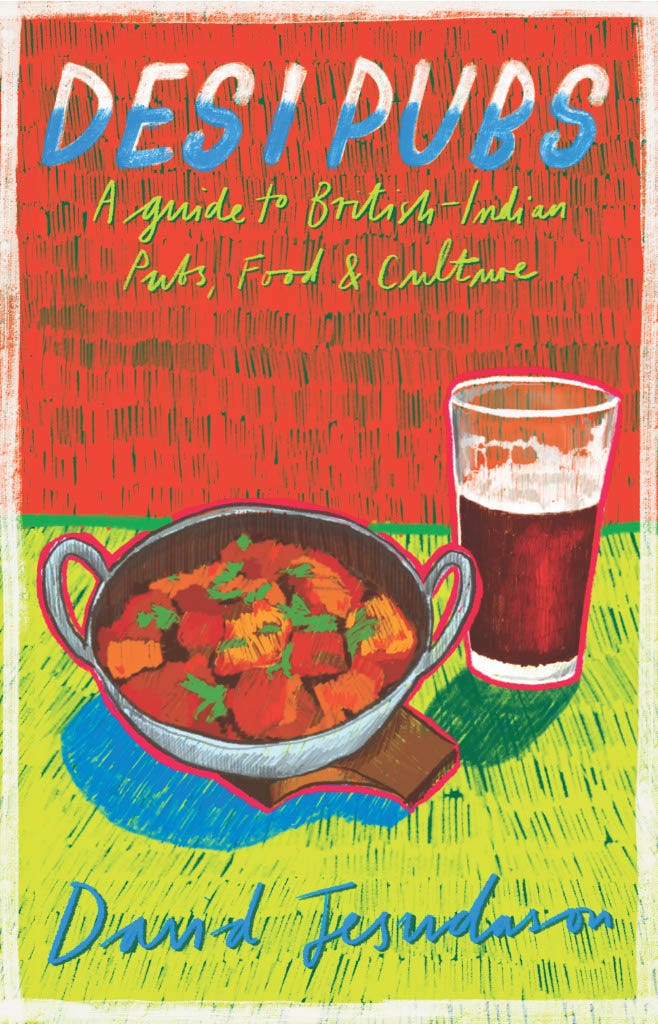Tickell Arms - Whittlesford, Cambridgeshire
Welcome to this 1970s pub where people are attacked for being black, supporting nuclear disarmament or not wearing shoes
This article took a lot of research to put together. Please donate as much as you can to my Ko-Fi here to support it! If you’ve not done so already please buy Desi Pubs - A guide to British-Indian Pubs, Food & Culture here - hailed as “the most important volume on pubs in 50 years”.
If you’re looking for information on BrewDog Waterloo this link will help.
Disclaimer: this newsletter often mentions beer and pubs. You do not have to read this if your life has been affected by substance abuse.
I am a journalist who covers race issues for BBC Culture, Pellicle and Vittles. I was named Beer Writer of the Year in 2023 by the British Guild of Beer Writers.
This is an odd story but shows what you can find in newspaper archives. It started two years ago when I was given a bunch of old newspaper clippings about the colour bar during a visit to Brixton’s Black Cultural Archives. After a bit more research I started to realize that this was a tale I had to tell because despite the subject matter it’s quite amusing. It still has gruelling parts but the protagonist is quite simply ridiculous.
“One has an absolute right to refuse service to anyone without reason. Or rather, one has until this moment.”
And so began the story of a charmless man.
The words above were spoken in 1969 by the ‘esquire’ and proprietor of the Tickell Arms, Whittlesford, Cambridgeshire, Joseph (AKA John or Kim) Hollick de la Taste Tickell. To give you a taste of Tickell - the pub itself - it was most famous for being where Lord Snowdon tended the bar when he was at university, and today it still operates alongside the Bees in the Wall seven miles south of Cambridge.
Tickell had been a publican there since 1958; his family (he claimed) at one time owned 11,000 acres but in 1970 this had dwindled to fewer than 100 acres. Despite this shrinking Cambridgeshire empire - or because of it - he ran the Tickell Arms as a mini-fiefdom which largely manifested itself as him deciding who was or wasn’t allowed to drink there.
He barred people for a lot of class-based reasons which seem bizarre today. One of his biggest annoyances were people who wore braces - calling them “hideous apparel worn by grubby people and are offensive to me and other customers”. In fact, a lot of the reasons for barring people were ridiculous, like in 1973 he threw out a group of drinkers for wearing nuclear disarmament badges.
Tickell did, however, have no problem with rightwing political messaging and he proudly displayed two signs behind the bar - “Hands of Rhodesia” and “Keep the Falklands British”. He also gave speeches to local trade bodies - wearing a monocle around his neck and gold cufflinks - criticising customers who wanted chips with every meal and ate “deep freeze food and foreign-sounding fare”.
He paternalistically longed for the time of greater inequality when his great-grandmother would visit poor people in the village and gift them blankets. His golden age was in the 1930s and he once said: “I long for the days of elegance and good manners just before the last war”.
Despite inheriting land and wealth he hated people on “national assistance” who spent their money on gambling and alcohol (!) while their kids were “ill fed and clad”. He believed the upper classes gave the lower classes “a shining example to look up to” - presumably he viewed himself as landed gentry despite having to pull pints.
In spite of his discriminatory policies he felt empowered enough to seek interviews and a lot can be discovered about British life in the 60s and 70s from this press coverage especially as the prejudice I’ve mentioned seems familiar.
So when in March 1971 the Daily Mirror visited, Tickell held court and the paper waxed lyrical about how he seemed to be preserving a certain Britishness which died a long time ago. Despite being a prejudiced fool, he’s described in glowing terms and even compared to a delicate creature.
This is Joseph Hollick de la Taste Tickell, a strangely beguiling, ageing elegant butterfly from an elegant, butterfly age — the Daily Mirror
This description would have jarred with a lot of visitors to his pub especially because just a year before this Mirror puff piece, Tickell, when aged 52, attacked a man with a mace.
The mace was described by the prosecution in the resulting trial as a “mediaeval weapon with a long handle with a ball on the end, with vicious spikes in the head of the ball”.
He also slashed the same man - Lawrence John Woods - with a carving knife. He said that he was acting out of self defence and that Woods and a group of people would re-enter and “smash the place up”.
The ‘violent’ gang were Woods, his wife, daughter, son-in-law and some friends from the States - a family (the Camerons) with two daughters. Tickell appeared to become enraged because one of the Cameron daughters took their shoes off.
The publican said: “If you have a comment to make about the way I run my establishment, now is the time to get it off your chest.” He then attacked Woods twice with the knife causing a cut on his hand and for him to bleed. Brandishing the mace he said: “Is anyone next? I will take on anyone here!”
He was fined in October 1970 £50 for carrying an offensive weapon - the mace - but found not guilty of GBH. “There will be champagne tonight,” he told the press outside of court.
That description of being like a butterfly will also come as a massive surprise to many other customers, especially those non-white as Tickell had barred a customer from Antigua and an Asian man from Ghana.
In May 1969, he had also refused to serve a Trinidadian who visited with a white student female friend from Cambridge, claiming it was because he made “an unwarranted attack upon my country” and not because of his race. (Although he did go on to say: “I might have suggested he went back from where he came from.”)
After the two people from Antigua and Ghana were refused service, the Tickell Arms was investigated by the Race Relations Board much to Tickell’s annoyance especially because the two people from the board who visited the pub didn’t impress the publican.
“It’s fantastic that neither of the two men who visited me were English.” I assume by these words that Tickell equated colour with nationality but he also wasn’t in the mood for the reconciliation that the Board offered - “I am not interested in such people”.
A newspaper report at the time claimed he had “coloured” students in his pub - which is unlikely because that’s on Tickell’s word and herein lies the problem. To find examples of the colour bar and historical racism researchers, such as I, have to read endless accounts of racism from the racist’s perspective and the victims are never interviewed.
You may ask why bother? Firstly, there’s the issue of white people who claim racism was never an issue in this country and segregation never existed, only in America and South Africa. Secondly, we don’t really have this kind of social history taught in schools.
The effect of this group ignorance can manifest itself in very strange ways in 2024. One example that still dumbfounds me is during a book event I held in Sheffield a young woman of colour couldn’t believe segregation happened in this country when I told her the story of the Brockley Barge.
She believed the Barnsley she grew up in to be post-racist and the rest of the country to be the same which is something that goes against the evidence, such as racism reports.
That’s why I believe the story of Tickell might be uncomfortable to hear but prescient. It shows a time when racist buffoons were given centre stage and a platform despite their actions. Something which I’m sure that young woman from Barnsley believes couldn’t possibly happen today…






